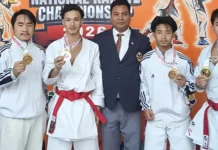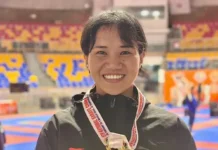Correspondent
PASIGHAT, 21 Apr: Former union minister of state for external affairs Meenakshi Lekhi advocated the ‘One Nation, One Election [ONOE]’ policy, saying that it can minimise election expenditure and promote higher voter turnout.
Lekhi emphasised the relevance of simultaneous elections in India’s current political scenario, highlighting its potential benefits for the country’s democratic process.
She was addressing a seminar organised by the state’s coordination committee for ONOE at Gidii Notko here in East Siang district on Monday.
The former union minister highlighted the challenges posed by frequent elections, citing their impact on developmental schemes, public servants’ productivity, and academic activities.
She urged citizens to support the union government’s ONOE policy, emphasising its potential to bring about a positive change in the country’s electoral system.
State BJP president Kaling Moyong expressed concern over frequent elections, and advocated the ONOE policy, highlighting its potential to ensure smoother governance. He noted that several leading national English news agencies have positively viewed the proposal for simultaneous elections.
Tana Jiri, winner of the state-level Viksit Bharat Youth Parliament from Papum Pare, criticised the costly election system in India, highlighting the country’s significant Below Poverty Line population. She emphasised the need for a more sustainable and cost-effective electoral process.
Retired IAF group captain Mohonto Pangging Pao, and ONOE campaign coordinators Nyamar Karbak, Prof David Gao, and Tobom Dai expressed support for the government’s ONOE policy.
The speakers noted that India held simultaneous general elections from 1951 to 1967. This trend was disrupted during Indira Gandhi’s regime when President’s Rule was invoked under Article 356 of the Constitution, leading to staggered elections.


